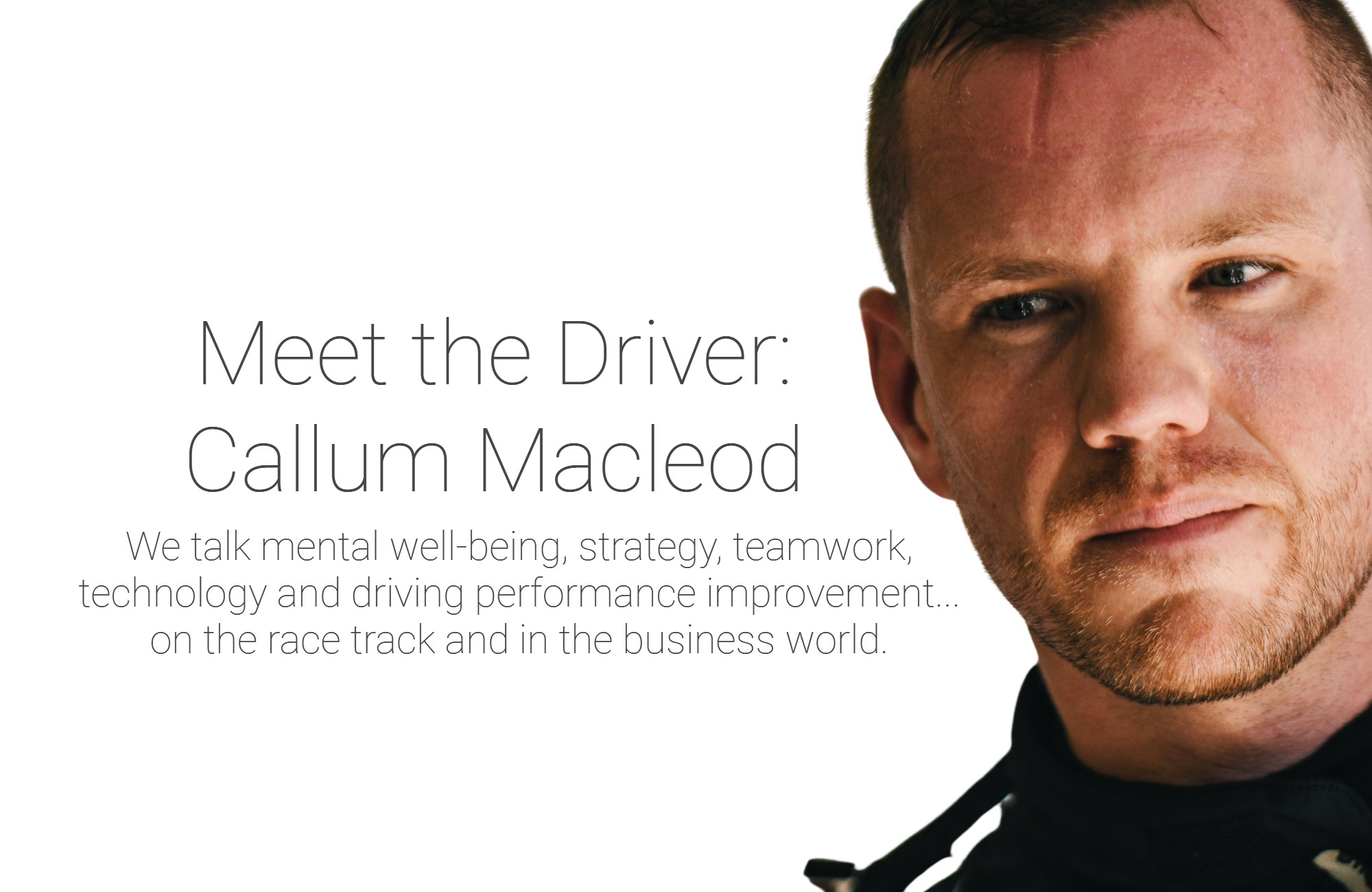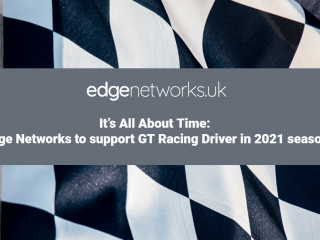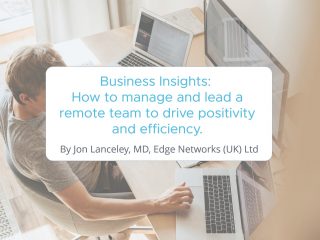Meet the Driver: Callum Macleod
We caught up with our training partner and Edge affiliated racing driver, Callum Macleod, to discuss the synergies between the personal and professional challenges he meets in both motorsport and the business world. Callum gives us his take on managing high-pressure situations, the effects of remote working on mental well-being, strategy, teamwork, technology and driving performance improvement.
What made you want to pursue a career in motorsport?
My Dad took me to the British Grand Prix in 1995 when I was 7 years old. I loved everything about it from the sound of the engines to the atmosphere of the crowd, but it was the sheer speed of the cars that fascinated me the most. A week later Dad put me in a go kart at our local indoor kart track and I was instantly hooked.
What have been your career highlights to date?
Winning the 2007 British Formula Ford championship is up there as that was the first season in car racing that I was able to showcase what I can do. I would probably say that the standout moment was winning the Silverstone 500 British GT race in 2019. It’s the blue riband event of the series that attracts the strongest grid. We’d missed the last race as my teammate broke his collar bone in a bike accident. We took the lead of the race with just 3 minutes to go in a gruelling 3-hour race. It was quite a dramatic victory and the first with my current team RAM Racing.
What would you say are your greatest professional strengths as a racing car driver?
I would say that my greatest strength is actually needed outside of the race car, resilience. As a driver with no family money behind me whatsoever I have had a huge number of setbacks where I have lost drives to drivers with budgets. It’s the nature of the sport and not something that is likely to change. If you believe in yourself then you have to accept that and keep going. Even when you have a drive it can disappear at any moment through no fault of your own, it can be really tough, emotionally exhausting. That’s where strength of character and experience comes into it. As you get older and more experienced you learn to cope with and recover from the setbacks more efficiently.
Can you take us to a high-pressure situation on track which you experienced?
Yes, loads, but the one that sticks in my mind is from 2010, the start of the European Formula 3 Open race at Jarama. I was starting from pole, which is great, fastest in qualifying, what could possibly go wrong? Well, it was only my 2nd pole in Formula 3. My first pole ended horrendously – I made an awful start, the clutches on a Formula 3 car are incredibly sharp and you use full throttle to launch then try to control the wheel spin through the clutch. I bogged down losing the least instantly and in a moment of red mist I tried to make up for it with late braking into turn one and went straight into the gravel and into the barrier. It was emotionally and financially devastating on my shoe string budget. I’ve never felt as nervous about a race start in my life as I did that day at Jarama. I couldn’t sleep the night before and I was just praying that I got away well from the start line. Knowing that I needed a clean race added even more pressure as anymore damage bills would be season over, and I was operating on a third of the other front runners’ budgets. The warmup lap was a blur, all I could think about were the lights going out and making sure my clutch control was on point. Luckily, it was, I made a great start and went on to win the race. Relief was the overwhelming sensation once I crossed the finish line.
What are the biggest challenges for a racing driver like yourself?
The biggest challenge by far is making sure that I am on the grid. Racing is my main source of income and with the ongoing challenge of drivers with budgets queueing up for the top drives it is a real challenge.
During a 12 or 24-hour race how do you overcome the obstacle of staying focused until you’re ready for a driver change?
To be honest, staying focussed really isn’t an issue at all. The whole team are solely focussed on making sure that the car runs faultlessly and manage all the organisation of when you need to be in the car, when you should eat, when you should try and get some sleep etc. In endurance racing a good team running the car is the key and all I must concentrate on is doing my job to the best of my ability.
Being part of a team, how do you define success as a GT racing car driver?
The nature of GT racing with different manufacturers means that you won’t always have the fastest car at every circuit in all conditions and so sometimes the finishing position isn’t the defining factor as to whether the race has been a success. The most important thing is maximising the result each weekend, making sure that the pit stops and driver changes are perfect, staying out of trouble on track, making the right strategy calls and consistently putting in fast laps. If we achieve all of that then it has been a success that is usually rewarded with a very strong result. Each and every step needed to achieve this is a team effort from the pre-race preparation in the workshop to the chequered flag.
Over the years how have technology advancements impacted the sport and in turn, your driving?
Technology in motorsport never stands still; manufacturers use it as a platform to develop new technologies that they can apply to their road cars. From a driving perspective you are constantly developing your techniques to work with the latest technology. I started in Formula Ford with a 4 speed H pattern manual gearbox, no traction control, no ABS. Now I race GT cars, often with auto clutches, all with paddle shift gears, traction control and ABS. You have to completely alter your driving style to work with the systems. The level of data we get from the race car has grown hugely in my time as a driver. We can see every single input we make in the form of data traces and graphs, after every session we analyse the data to see how we can improve to try and find those last few tenths of a second.
How have you adapted your training over the past year during the pandemic?
It’s been a very strange time for everyone. The obvious physical training elements have had to move from the gym to outdoors and from using top of the line equipment to dumbbells and body weights. The driving training has been really interesting, utilising the latest in simulator technology has been an eye opener for me, the level of realism is staggering and you can spend a lot of time working on various techniques that help keep you sharp for when you’re back in the car. Using this type of technology in between races is definitely something I will be continuing post pandemic.
When he’s not on the track, Callum spends some of his time working for alternative training and education consultancy – Mind over Matter (MOM), a training partner to Edge Networks.
Alongside motorsport, you also represent MOM. Tell us a bit about it.
I’ve known Chris Kemp, the brains behind MOM, for a number of years. Amongst other things, Chris is a fantastic human performance coach, he has a list of qualifications the length of Hangar Straight at Silverstone! Chris has worked with a very diverse range of clients, top level businessmen and women, sports coaches such as Gareth Southgate, organisations like the FA and Wembley…the list goes on. Chris uses a lot of scenario-based learning exercises and developed a scenario called the Ultimate GP. While doing this, Chris contacted me for advice to ensure realism was maintained throughout the scenario. I spend a lot of my time between races coaching amateur drivers, primarily businessmen who now have the funds to enjoy themselves and get into racing. Chris recognised some traits in me that he felt would aid the course and so we got talking. Now, we are working on a number of projects together. One of the projects that really excites me are MOM’s Remote Working Performance courses. I think it’s a really relevant subject at the moment with the current global situation. I know first-hand how lonely days can be with nothing but your laptop for company and the challenges this brings. Aside from the race weekends where I have the support of my race team, I have been working remotely my whole career. It is a set of skills that have taken a lot of work and refinement, but skills that have ultimately enabled me to create a business and have a racing career.
What inspired you to get into this line of business?
Chris’s enthusiasm for helping others improve their performance and sometimes look at things differently to benefit the team’s performance was a big factor. I saw a way that I may be able to improve myself and my role within the race team that will ultimately help improve results on track. I’ve now seen how Chris and his team at MOM can help businesses and coaches achieve better results, sometimes individually, more commonly as a team. It is in my nature to be striving to better myself and the team I am a part of and so it seemed like a no brainer to get involved when given the opportunity.
Are there any synergies between motorsport and the work you do with MOM Consulting?
A first I wasn’t too sure, but once we got talking I could see a lot of similarities with what I do on a daily basis when racing and what MOM do – analysis, strategy, planning, implementation, improvements. These are all key areas that need looking at to become a better racing driver or race team. I also see a lot of necessity within motorsport for MOM’s approach to mental wellbeing. Motorsport is such a high-pressure environment with big highs and very low lows. The adrenaline come downs, the anxiety of where your next race and paycheque is coming from, the loneliness of remote working when looking for opportunities, can all have an impact on your outlook. MOM are very experienced in helping people with this and I personally think that their expertise would help in a number of high pressure environments.
What’s next for you both from a motorsport a business perspective?
Racing plans for the 2021 season are looking very promising, however, not quite at the announcement stage yet as we finalise the last few pieces of the jigsaw. As soon as we are ready to announce them you will be the first to know. On the business front I’m really excited to be expanding my involvement with MOM consultancy and developing our new partnership with Edge and seeing what exciting opportunities come from it for the future.
Finally, would your wife say you’re a terrible back seat driver?
Haha, I don’t think she would actually. I am a very relaxed passenger, I actually love a car nap (not whilst driving!!)
If you’d like to find out more about MOM’s training and education services visit https://www.momconsultancy.com/







